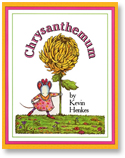Book Review – Chrysanthemum

Reading Aloud: A Pathway to Talking about Feelings With Young Children
Fall is officially here, and its cooler days and longer nights provide a great opportunity to curl up and read with your pre-schooler. In my work as a parenting consultant, I often encourage parents to read books with their young children as a way to facilitate discussions about difficult feelings their children may have. Direct conversations about their own feelings are sometimes difficult for children, and books can be a useful aid.
Engaging young children in conversations about emotionally charged topics can be challenging because they may not yet have the language skills necessary to identify and express complex feelings. Even when children have the necessary vocabulary, they may have difficulty talking about their feelings because they fear censure or rejection by their parents if they reveal socially unacceptable feelings such as anger or jealousy. Talking about characters in a story not only provides a ready vocabulary, it also allows children to discuss feelings in a less personally threatening way. For example, in Kevin Henkes’s book Chrysanthemum, Chrysanthemum is teased about her name. How much easier it is for a child to talk about Chrysanthemum’s distress than her own. And how reassuring for that child to see that, in the end, loving adults are able to help Chrysanthemum solver her problem. With a parent’s support, shared stories can become useful vehicles to discuss feelings, experiences, and concerns.
Parents often ask me to recommend books they could use as a springboard for discussions with their young children. I have listed some of my favorites below. Many of these books are older, but are still available at the library or online.
Contrary Mary (Anita Jeram): An amusing look at contrariness.
Chrysanthemum (Kevin Henkes): Addresses teasing by classmates.
Harriet, You’ll Drive Me Wild! (Mem Fox): A light-hearted look at parenting a very active child.
Lilly’s Purple Plastic Purse (Kevin Henkes): Touches on making the world a better place.
Morris’s Disappearing Bag (Rosemary Wells): Addresses sibling issues and feeling left out.
Noisy Nora (Rosemary Wells): A look at sibling rivalry and “middle child” issues.
Owen (Kevin Henkes): Helping a child give up a “lovey” (attachment object)
The Tenth Good Thing About Barney (Judith Viorst): Dealing with a death of a pet.
Weslandia (Kevin Henkes): A story about gaining acceptance while being true to yourself.
When Sophie Gets Angry – Really, Really Angry (Molly Bang): A look at dealing with very big angry feelings. The story and illustrations beautifully capture the physical intensity of a child’s anger.
There are of course, many, many more delightful books to share with your children; your local librarian can be a terrific resource in finding them.
Nancy H. Sedlack, Ph.D., is a clinical child psychologist working as a parenting consultant at Stamford Pediatrics. She would be happy to meet with you to further book recommendations or any other issues concerning your children. You can reach her at Stamford Pediatrics (203) 655-3307.
